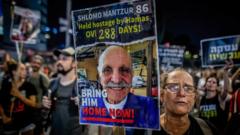The latest developments in the ongoing conflict between Israel and Hamas have seen the transfer of four Israeli hostages' bodies by Hamas as part of a significant prisoner exchange operation. In an unprecedented move, Israel is now vetting DNA samples to verify the identities of the deceased: Shlomo Mansour, 86, Ohad Yahalomi, 50, Tsachi Idan, 50, and Itzik Elgarat, 69, who were taken captive during the Hamas-led attacks on October 7, 2023.
Israeli Hostage Exchange: Hamas Delivers Bodies of Four Hostages as Prisoner Release Ceremony Begins

Israeli Hostage Exchange: Hamas Delivers Bodies of Four Hostages as Prisoner Release Ceremony Begins
Amid escalating tensions, Hamas transfers four Israeli bodies while Israel releases hundreds of Palestinian prisoners.
On Thursday morning, Israel commenced the release of over 600 Palestinian prisoners, with many returning to the occupied territories of the West Bank and Gaza, where they were greeted by enthusiastic crowds and family reunions. This exchange marks the conclusion of the first phase of a ceasefire agreement set to expire on Saturday, with its future uncertain.
The Israeli authorities have yet to confirm the results of the DNA tests on the returned bodies, with initial examinations occurring close to the Israel-Gaza border and later transferred to a forensic lab in Tel Aviv. Tensions further escalated last week when a misidentified body exchanged had incited public outcry in Israel, highlighting the sensitivity surrounding the handling of remains. Hamas claimed misidentification before rectifying the error, but the delivery of the bodies was executed discreetly without a public ceremony.
A Hamas representative indicated that the exchanges were intended to occur in the absence of media to avoid delaying the process, following past accusations that Hamas had conducted "humiliating" handover ceremonies. Images from the Reuters news agency depicted a chaotic scene as a bus transporting released Palestinian prisoners arrived at the Ramallah Cultural Palace, swarmed by jubilant supporters.
This round of releases included over 400 prisoners from Gaza, some of whom had been detained during the latest conflict, and about 50 serving life sentences in Israeli prisons. Both Ofer and Ketziot prisons were tapped for the personnel transfers.
Family narratives surrounding the deceased hostages are stirring powerful sentiments. Tsachi Idan's family expressed deep sorrow over learning of his death, as they recalled the violence during his kidnapping alongside his family. Similarly, Israeli military notes indicate that Mansour was among those killed in the attack, and his remains were taken to Gaza after being abducted.
The exchange comes with the broader context of a fragile ceasefire deal that should conclude on Saturday, leaving many questions regarding further negotiations for the release of remaining living hostages still in Gaza. Despite anticipated discussions for a new phase of the agreement, progress is seemingly stalled.
Israeli media extensively covered a funeral procession for three of the deceased hostages—Shiri Bibas and her two children—which drew significant public attention and mourning across the nation. This latest context follows a violent conflict that has already claimed thousands of lives, making it a pivotal point in the ongoing Israel-Gaza saga.
In total, around 1,200 individuals died during the conflict, and 251 were taken hostage, creating a tumultuous legacy that continues to resonate deeply within the affected communities as they navigate the aftermath.
The Israeli authorities have yet to confirm the results of the DNA tests on the returned bodies, with initial examinations occurring close to the Israel-Gaza border and later transferred to a forensic lab in Tel Aviv. Tensions further escalated last week when a misidentified body exchanged had incited public outcry in Israel, highlighting the sensitivity surrounding the handling of remains. Hamas claimed misidentification before rectifying the error, but the delivery of the bodies was executed discreetly without a public ceremony.
A Hamas representative indicated that the exchanges were intended to occur in the absence of media to avoid delaying the process, following past accusations that Hamas had conducted "humiliating" handover ceremonies. Images from the Reuters news agency depicted a chaotic scene as a bus transporting released Palestinian prisoners arrived at the Ramallah Cultural Palace, swarmed by jubilant supporters.
This round of releases included over 400 prisoners from Gaza, some of whom had been detained during the latest conflict, and about 50 serving life sentences in Israeli prisons. Both Ofer and Ketziot prisons were tapped for the personnel transfers.
Family narratives surrounding the deceased hostages are stirring powerful sentiments. Tsachi Idan's family expressed deep sorrow over learning of his death, as they recalled the violence during his kidnapping alongside his family. Similarly, Israeli military notes indicate that Mansour was among those killed in the attack, and his remains were taken to Gaza after being abducted.
The exchange comes with the broader context of a fragile ceasefire deal that should conclude on Saturday, leaving many questions regarding further negotiations for the release of remaining living hostages still in Gaza. Despite anticipated discussions for a new phase of the agreement, progress is seemingly stalled.
Israeli media extensively covered a funeral procession for three of the deceased hostages—Shiri Bibas and her two children—which drew significant public attention and mourning across the nation. This latest context follows a violent conflict that has already claimed thousands of lives, making it a pivotal point in the ongoing Israel-Gaza saga.
In total, around 1,200 individuals died during the conflict, and 251 were taken hostage, creating a tumultuous legacy that continues to resonate deeply within the affected communities as they navigate the aftermath.




















